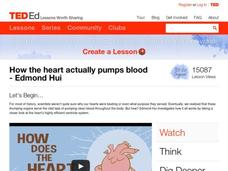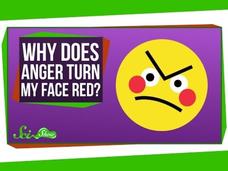TED-Ed
Why Do We Harvest Horseshoe Crab Blood?
If you've ever had an injection, the horseshoe crab protects you from infection! Young marine biologists discover how scientists use the unique physiology of the horseshoe crab in medicine with a thought-provoking video. The narrator...
Bozeman Science
Organ Systems
Blood passes through the kidneys about 300 times a day. Show your class how the kidney and bladder work together to filter blood in the excretory system. This 19th video in the series explores how the circulatory and respiratory systems...
Bozeman Science
Circulatory System
The average person's heart beats about three billion times during their lifetime. In this circulatory system video, learners briefly see the difference between an open and closed circulatory system. The rest of the video focuses on the...
TED-Ed
How the Heart Actually Pumps Blood
Let your heart rejoice! A unique video explains in detail how the heart works to transport blood throughout the human body. Use it during your human body unit, and then discuss the accompanying comprehension questions as a review of the...
Curated OER
The First Few Weeks
As the title implies, the first few weeks of a baby's development are shown in the animated video. From its beginnings as a blastocyst to cell differentiation and intense development, see just how complex reproduction and the beginning...
Bite Sci-zed
Why Red Blood Cells Look Like Donuts
There are specific reasons for the intricate anatomy of the body, and the shape of the red blood cells is no exception! A video presentation explains the role of red blood cells and why their shape is important to function. The...
PBS
The Evolution of the Heart (A Love Story)
Not all hearts are the same, but their functions are similar. An instructor discusses the origin of the first organisms with a heart in a video lesson from the PBS Eons series. The lesson includes discussion of the evolution of the...
Crash Course
The New Anatomy: Crash Course History of Science #15
How did scientists move beyond the medical ideas of Galen? Dissect the past with the 15th installment in a History of Science video series. Topics include Vesalius' dissections, the microscope, and mapping the human body.
FuseSchool
What Are White Blood Cells?
White blood cells are our body's tiniest warriors! How do they work? Biology scholars discover the types and functions of white blood cells through a video from an intriguing biology playlist. The resource profiles both types of white...
American Chemical Society
Why is Carbon Monoxide So Deadly?
Don't fall victim to The Silent Killer! Expose your class (not literally) to carbon monoxide through an informative video from Reactions, a playlist from the American Chemical Society. Content includes carbon monoxide's structure, its...
SciShow
Why Does My Face Turn Red When I'm Angry?
How does the fight or flight response affect our body systems? The video presenter gives a description of the nervous system response. As a person deals with anger, the nervous system communicates to the circulatory system and results in...
Crash Course
Circulatory and Respiratory Systems
Viewers follow the paths of oxygen and carbon dioxide through the human respiratory organs and the path of the molecules through the human circulatory system, in a short video about how the body delivers oxygen and picks up...
Amoeba Sisters
Human Body Systems: The 11 Champions
An informative video offers a brief overview of the 11 systems in the human body. It gives a brief description of each before pointing out their interdependence.
TED-Ed
How Do Your Kidneys Work?
If humans can live without one kidney, how important can they really be? Investigate the vital role these organs play in filtering our blood, removing waste, and managing our bodies' water supply with this short animated video.
TED-Ed
What Does the Liver Do?
It's the heaviest organ in the human body, but exactly what role does the liver play in sustaining life? Follow along with this short video as it explores the various ways the liver filters, stores, and manufactures materials...
Nemours KidsHealth
How the Body Works: The Heart
Where is the heart? What does it do? What other organs help it carry out its function? Here is a hearty little video that answers such questions! With a casual tone and colorful animation, elementary and middle schoolers will fall in...
Curated OER
How the Body Works: The Lymphatic System
Begin to show the workings of the lymphatic system with this video. Right when the narrator gets to the lymph nodes though, the video unfortunately cuts off mid-sentence. Use the video to show the connection between the lymphatic system...
Bill Nye
Bill Nye The Science Guy on Blood and Circulation
Did you know that high-speed aviators need to wear a special g-suit in order to keep blood flowing to their brains when experiencing intense acceleration forces? Bill Nye takes a flight in such a situation. After his trip, two facts...

















